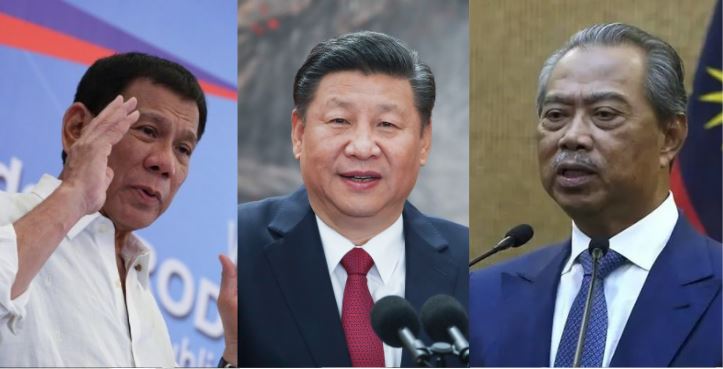Sixteen aircraft from the People’s Liberation Army Air Force (PLAAF) conducted a large-scale transport formation exercise over the South China Sea near Borneo on Monday and entered the airspace of Malaysia’s exclusive economic zone (EEZ). The Royal Malaysian Air Force (RMAF) said the Chinese aircraft were in a tactical trail formation spanning 60 kilometres, or approximately 37 miles. In response to the blatant incursion, Malaysia dispatched two Hawk 208 fighter aircraft. With the said incursion, China has once again laid the foundation of facing yet another massive humiliation.
China is still engaged in a tense standoff with the Philippines over the Whitsun reef, where over 200 Chinese militia vessels continue to assert themselves. The area involved in the present dispute between China and the Philippines is well within the 200-nautical mile exclusive economic zone (EEZ) of the Philippines. China thought it had a friend in the form of President Rodrigo Duterte. However, the realisation dawned late on them that Duterte was hardly in control over matters of defence and security.
The Philippine defence establishment has stood up to China and continues to have very good relations with the United States, notwithstanding the blatant anti-America rhetoric which Duterte has been spewing for quite some time now. Our point is that China does not understand Southeast Asian countries half as well it thinks it does. The standoff with the Philippines should have taught China a lesson or two. But it seems the CCP likes getting punished, humiliated and taught a lesson publicly.
Read more: How the Philippines’ defence establishment saved its country from becoming a Chinese puppet
So, China is now trying its luck with Malaysia. With the largescale air incursion into Malaysian territory, China has effectively conveyed its willingness to heighten tensions with another ASEAN country. A statement by the Malaysian foreign ministry read, “The Ministry will issue a diplomatic note of protest against the intrusion to the Government of the People’s Republic of China. The Ministry will also summon the Ambassador of the People’s Republic of China to Malaysia to provide an explanation regarding this breach of the Malaysian airspace and sovereignty by the 16 PLAAF aircraft.”
So, Malaysia too does not seem to be shying away from a fight. Though it is true that Prime Minister Muhyiddin Yassin only in late May said Malaysia and China are exploring new areas of common interests to strengthen bilateral collaboration, apart from existing cooperation in economy, trade and investment, much like the Philippines – the Malaysian establishment too understands that accepting a Chinese walkover can be domestically suicidal.
In fact, Malaysia has seen the ouster of two stalwart prime ministers, because while their campaign rhetoric was heavily anti-China, after assuming power, almost every leader started parroting the CCP’s line. Whether it be Najib Razak or Mahathir Mohamad, or now, Muhyiddin Yassin. However – trends from Malaysia also suggest how pro-China leaders are almost always ousted from power by the public.
Muhyiddin Yassin has that trend to work with. He is serving his first term as the Prime Minister of Malaysia, and being unseated from power after his very first term would not be a very favourable proposition for the man. Yassin has a razor-thin majority in the Malaysian parliament, and the opposition – and many of his own allies are continually breathing fire down the prime minister’s neck.
As such, for Muhyiddin Yassin to be even remotely seen toeing the line of China would be suicidal, and an open invitation for all political forces in Malaysia to effectuate his ouster from power. The thing with democracies is this – the will of the people reigns supreme, something which China cannot possibly comprehend. So, in Malaysia, leaders cannot be seen to be warming up to China, as that would result in them being kicked out of power.
The will of the people has a lot to do with the foreign and security policy of democracies. So, China’s aggression against Malaysia will not be taken lying down. If a fight is what China wants, a fight is what it will get. Xi Jinping has altered the equations across the Indo-Pacific dramatically ever since he assumed power in China. Prior to his tyrannical reign, Southeast Asian nations looked up to China as a big brother of sorts. Now, they look down on the paper dragon as an enemy and hostile state.
China might think it is very easy to scare ASEAN countries. However, almost every time, it is China that gets humiliated internationally. Xi Jinping must take out some time from being a despot and introspect on why he is making his country a joke around the world.
